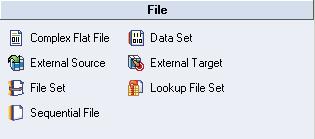Complex Flat File Stage Datastage Example Programs

InfoSphere DataStage is also flexible about meta data. It can cope with the situation where meta data is not fully defined.
- Complex Flat File Stage In Datastage With Example
- Complex Flat File Stage Datastage Example Programs List
- Complex Flat File Stage Datastage Example Programs Download
- Complex Flat File Stage Datastage Example Programs Free

ETL tools use the definition file to determine the formatting of the file. Use of Stages in Datastage 8.5 or 8x Series. Complex Flat File. External Source stage allows us to interact with or call external programs. This stage is. Complex flat file data load to a table This document gives the step by step procedure to develop a data stage job. Complex flat file allows reading from complex file structures on a mainframe machine, such as MVS data sets, header and trailer structured files, files that contain multiple record types, QSAM and VSAM files. External Source - permits reading data that is output from multiple source programs.
You can define part of your schema and specify that, if your job encounters extra columns that are not defined in the meta data when it actually runs, it will adopt these extra columns and propagate them through the rest of the job.
- Processing Stages In Datastage; Sequential File In Datastage; Wave Generator Stage In Datastage; Apr 27, 2013 - The Complex Flat File stage lets you convert data extracted from. For example, use records with various structures for different types of. Processing Stages In Datastage. Do you know, you have another way to define columns other than.
- The Complex Flat File stage lets you convert data extracted from complex flat files that are generated on an IBM mainframe. A complex flat file has hierarchical structure in its arrangement of columns. It is physically flat (that is, it has no pointers or other complicated infrastructure), but logically represents parent-child relationships.
- Aug 22, 2018 The Complex Flat File (CFF) stage is a file stage. You can use the stage to read a file or write to a file, but you cannot use the same stage to do both. As a source, the CFF stage can have multiple output links and a single reject link. You can read data from one or more complex flat files, including MVS™ data sets with QSAM and VSAM files.
This is known as Runtime Column Propagation (RCP).
Word document on imac. RCP can be enabled for a project via the Administrator client, and set for individual links via the Output Page Columns tab for most stages, or in the Output page General tab for Transformer stages.
You should always ensure that runtime column propagation is turned on if you want to use schema files to define column meta data.
Complex Flat File Stage In Datastage With Example
When we run the Datastage Jobs, the columns may change from one stage to another stage. https://yoir.over-blog.com/2021/01/prefedit-4-3-1.html. At that point of time we will be loading the unnecessary columns in to the stage, which is not required.
If we want to load the required columns to load into the target, we can do this by enabling a RCP. Xbox 360 touch screen controller.
If we enable RCP, we can send the required columns into the target.
Complex Flat File Stage Datastage Example Programs List
RCP is mostly useful when we use reusable job where different metadata comes into the picture. Word for mac catalina.
Using RCP With Sequential Stages
Complex Flat File Stage Datastage Example Programs Download
Runtime column propagation (RCP) allows DataStage to be flexible about the columns you define in a job.
If RCP is enabled for a project, you can just define the columns you are interested in using in a job, but ask DataStage to propagate the other columns through the various stages.
Complex Flat File Stage Datastage Example Programs Free
So such columns can be extracted from the data source and end up on your data target without explicitly being operated on in between.
Read also: When should we use Sparse Lookup or Join in DataStage?
Sequential files, unlike most other data sources, do not have inherent column definitions, and so DataStage cannot always tell where there are extra columns that need propagating. Gopika gujarati font keyboard layout.
You can only use RCP on sequential files if you have used the Schema File property to specify a schema which describes all the columns in the sequential file.
You need to specify the same schema file for any similar stages in the job where you want to propagate columns. Stages that will require a schema file are:
- Sequential File
- File Set
- External Source
- External Target
- Column Import
- Column Export

Complex Flat File Stage Datastage Example Programs
UNDER MAINTENANCE